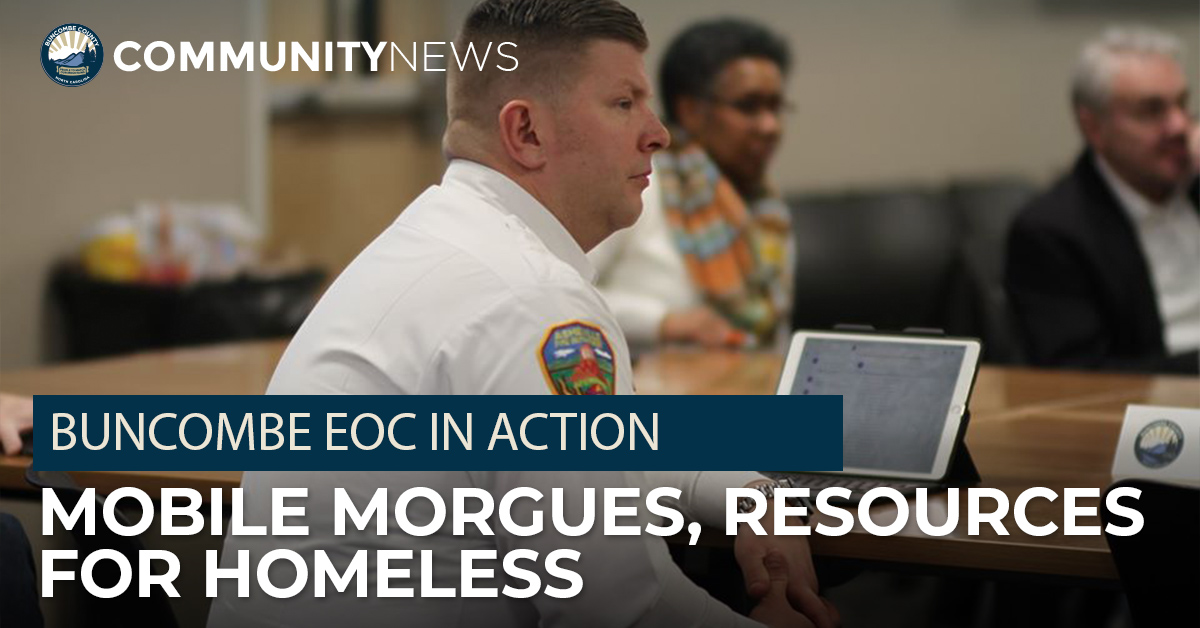This news item expired on Friday, April 23, 2021 so the information below could be outdated or incorrect.

This is the third in a series where we look at the diverse methods our EOC is using to meet real needs related to the COVID-19 pandemic. The first article “Buncombe EOC in Action: A Look at Community-Based Responses to COVID-19” can be found here. The second article “Buncombe EOC in Action: Hospital Surge Capacity, Interactive Food Assistance Map” can be found here.
Since news of the COVID-19 outbreak, Buncombe County officials have taken guidance from experts in the medical and scientific communities and treated this as a public health crisis. On March 12, Buncombe County proactively declared a state of emergency and put weeks’ worth of logistical planning into action by opening its emergency operations center (EOC). Since then, a collaboration of governments, nonprofits, school systems, and other stakeholders have been diligently and innovatively looking at ways to address myriad community needs stemming from COVID-19.
Below are some of the resources our EOC has developed and ways you can learn more about those programs.
Expanding morgue capacity: Planning for a potential COVID-19 spike
Morgues and funeral homes in Buncombe County normally operate at 50% capacity. A COVID-19 spike could challenge the capacity of Mission Hospital’s morgue and subsequently cause issues for local funeral homes. Members of the EOC tasked with looking into building out supplemental space audited community resources and found they could use mobile morgues. “The EOC has a plan to establish an alternate site to store any remains that need to be held until a funeral home can claim them,” explains EMS Training Officer Jamie Judd.
While this is a grim prospect, it’s a reality the County wants to be prepared for as the alternative would compound grief for those mourning the recently deceased. “It’s important the County help support these services to limit the impact to not only the hospital and funeral homes, but also supporting the families of those who died during this time,” says Judd. Should they be needed, the mobile morgues would be operated by the County in coordination with the Office of Decedent Affairs at Mission Hospital and local funeral homes to ensure remains are handled in a proper manner.
Caring for our homeless population: Mitigating COVID-19 spread, providing assistance
We know a large portion of Buncombe County’s homeless population is older and have underlying conditions that make put them in high-risk categories for COVID-19. In order to find the best way to help this group, the EOC worked with shelters, nonprofits, faith-based organizations, and other governments to inventory resources we can use for sheltering, medical supplies, and screening for COVID-19. As a result of these meetings, multiple responses aimed at helping the homeless population during this time have been implemented.
- Buncombe County Environmental Health is lending its staff to provide guidance on physical distancing, hygiene, and food handling best practices for area homeless service providers.
- The team identified and secured valuable resources such as containers for hot to-go meals
- In conjunction with the City of Asheville, we placed portable toilets and stations with soap and sanitizer in public spots
- EOC efforts helped support transitioning the Harrah’s Cherokee Center to an emergency shelter that can house, feed, and provide case management for 50 people.
- Community partners are developing an outreach plan to provide homeless campsites with food, supplies, and medical care if they can’t be relocated to a shelter.
Additionally, if you or anyone you know is experiencing homelessness and needs resources, call 211.
The following are also resources for food assistance that anyone can access:
Previous EOC in Action articles